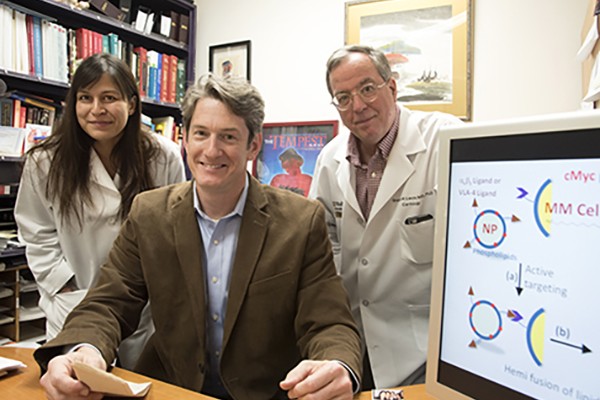Researcher Liu receives grant for work on Crohn’s
Ta-Chiang Liu, MD, PhD, assistant professor of pathology and immunology at Washington University School of Medicine in St. Louis, has received a three-year, $486,000 grant from The Doris Duke Charitable Foundation for research titled “Small Intestinal Paneth Cell Phenotype In Crohn’s Disease: Clinical Relevance And Genetic Associations.”
Duncan entrance to SLCH staff garage reopens, Newstead entrance closes June 1; lane restrictions on Duncan begin June 4
The Duncan Avenue entrance to the St. Louis Children’s Hospital (SLCH) staff parking garage will reopen June 1, a few days later than had been planned due to weather and other delays regarding a Metropolitan Sewer District storm-sewer line upgrade.
Nanotherapy effective in mice with multiple myeloma
Researchers have designed a nanoparticle-based therapy that is effective in treating mice with multiple myeloma, a cancer of bone marrow immune cells. Targeted specifically to the malignant cells, these nanoparticles protect their therapeutic cargo from degradation in the bloodstream and greatly enhance drug delivery into the cancer cells.
Mutch elected chair of Foundation for Women’s Cancer board of directors
David G. Mutch, MD, the Ira C. and Judith Gall Professor of Obstetrics and Gynecology at Washington University School of Medicine, has been elected chairman of the Foundation for Women’s Cancer board of directors.
Antiviral compound may protect brain from pathogens, West Nile virus study shows
Studying West Nile virus infection in mice, scientists at Washington University School of Medicine in St. Louis have shown that an antiviral compound tightens the blood-brain barrier, making it harder for the virus to invade the brain.
Klingensmith new president of Association for Surgical Education
Mary Klingensmith, MD, the Mary Culver Distinguished Professor and vice chair for education in the Department of Surgery, was installed as president of the Association for Surgical Education (ASE) at the organization’s annual meeting in Seattle.
Diabetes drug may reduce heart attack risk in HIV patients
A diabetes drug may have benefits beyond lower blood sugar in patients with HIV. New research from the laboratory of Kevin E. Yarasheski, PhD, suggests the drug may prevent cardiovascular problems because it works to reduce inflammation that is linked to heart disease and stroke in these patients. The drug both improved metabolism and reduced inflammation in HIV-positive adults on antiretroviral therapy.
Device developed at Washington University may allow sensations in prosthetic hands
To the nearly 2 million people in the United States living with the loss of a limb, prosthetic devices provide restored mobility, yet lack sensory feedback. A team of engineers and researchers at Washington University is working to change that so those with upper limb prosthetics can feel hot and cold and the sense of touch through their prosthetic hands.
Officers use portable heart device to save BJH employee
John VanderHeyden, a mechanic at Barnes-Jewish Hospital, said he is lucky to be alive after collapsing recently in a parking lot on the Medical Campus. He was revived by School of Medicine security officers, who immediately began chest compressions and used an automated external defibrillator (AED), a portable device that provides an electric shock to restore a heart’s normal rhythm.
School of Medicine nurses honored
Four School of Medicine nurses have received the 2015 Excellence in Nursing Award from St. Louis Magazine, honoring local nurses who have made a difference in the lives of their patients and colleagues.Pictured is Jennifer Wofford of the Department of Pediatrics, who received a perfect score from the award judges.
View More Stories



